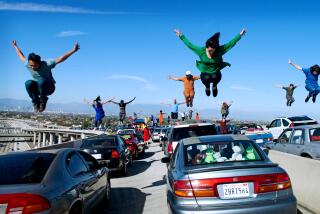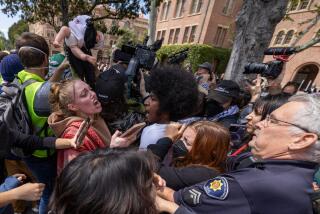Hollywood Won’t Yield the Oscar Stage to N.Y.
It’s never too early for Oscar season to begin, although the squabbling now isn’t over the movies but over the March telecast itself. As usual, Miramax Films’ larger-than-life impresario Harvey Weinstein is in the middle of the fight.
Indeed, Weinstein’s very public pronouncement about luring all or part of Hollywood’s biggest ceremony to New York City was met with polite skepticism Friday from the president of the Academy of Motion Pictures Arts and Sciences, and indignation from others.
“I think it’s ridiculous,” said producer Lili Fini Zanuck, who produced the 2000 awards with her husband, Richard. “The Oscars are a Hollywood tradition.”
Sounding weary from the sudden attention, academy President Frank Pierson said, “I would say this is a little media frenzy, which is fine but, for the record, we’re not moving the Oscars to New York.” The academy has not yet received a formal proposal from Weinstein, nor has the organization even spoken to New York Gov. George Pataki or Mayor Michael R. Bloomberg, both of whom have publicly praised the idea.
In a prepared statement Friday, Pierson said: “The academy is not moving the Academy Awards telecast to New York.... Discussion about the possibility of broadcasting a segment of the telecast from New York could take place, but not before a producer is on board. No producer has been appointed.”
Pierson seemed more open to the idea when he spoke to The Times late Thursday: “This year it was harder to bring Woody Allen to Hollywood than it would be to move part of the show to New York.”
“Everybody’s been taken by surprise by this,” said former academy President Robert Rehme, who noted that the academy is contractually obligated to base the show at the new Kodak Theatre in Hollywood, which is billed as Oscar’s home. “It’s the 75th anniversary of the Academy Awards. They’re planning a lot of special events,” Rehme said.
But Weinstein said that giving New York a piece of the Oscars will bring revenue and comfort to a city that is still suffering from the aftermath of the Sept. 11 terrorist attacks on the World Trade Center.
This is Weinstein’s second effort to aid New York with an entertainment event. Last year, he and Cablevision Systems President James Dolan produced “The Concert for New York,” which raised $35 million for victims of the attacks.
Weinstein has earned a reputation for orchestrating media frenzies, particularly around Oscar time. He dismissed speculation that his motivation is no more than a publicity stunt to draw attention to his big-budget Oscar film, “Gangs of New York,” which will be released at Christmas.
“Nothing like this would ever help someone’s Oscar chances. People don’t vote for a film just because we bring the Oscars to New York,” Weinstein said, dismissing the speculation. “And what are all those cynics doing to help New York after 9/11? I’d like every skeptic to personally match the $1-million dollar check I wrote to the relief effort.”
Weinstein and the independent movie company he and his brother Bob founded 23 years ago in New York are a fixture on Academy Awards night. Miramax has received 165 Oscar nominations since 1988 and has had a best picture nomination each of the last 10 years, winning for 1998’s “Shakespeare in Love” and 1996’s “The English Patient.” Weinstein was one of the pioneers of bare-knuckle Oscar campaigning, which today is common practice among studios.
Weinstein said he and Dolan are putting together an “all-star committee” of businesspeople, artists and academy members to work with government officials and others to formalize a proposal for the academy within 30 days. He intends to approach a number of high-profile media leaders, including Comcast chief Brian Roberts and Lachlan Murdoch, son of News Corp. head Rupert Murdoch, for donations to make the move possible. And he hopes to find an influential spokesman.
“We have to assure the academy it won’t cost them anything,” said Weinstein, who promised to appeal to downtown hotels, airlines and New York-based fashion designers to get on board with the initiative.
As for the show itself, few if any details of the proposal have been worked out. For instance, how can the show logically be divided? Would the presentation for best actor take place in New York and best actress in L.A.?
“By not having all the stars in one place, you diminish the appeal,” said producer Mark Johnson, who won an Oscar in 1989 for “Rain Man” and sits on the academy’s board of governors.
New York was spotlighted at the 74th Academy Awards in March, when Allen made his first appearance at an Oscar presentation. He introduced a retrospective saluting the city’s role in film history.
Pierson said his only conversation with Weinstein about the Oscar telecast was in January, when Weinstein suggested either moving the program to New York or making the event bicoastal. Pierson said he rejected both ideas.
“It was financially and economically impossible,” he said.
But Weinstein said the idea is not without precedent. From 1953 to 1957, the show was telecast from Hollywood and New York.
Pataki and Bloomberg said Friday that they weren’t after just the GOP and Democratic national conventions in 2004, but also had set their sights on Oscar night 2003.
“This is the place to stay for big events,” Bloomberg said. “This is a showcase place.”
Los Angeles Mayor James K. Hahn said through his spokeswoman that he was unaware of the move by officials in New York to lure the Academy Awards there. But the mayor said that, while he doesn’t object to sharing the Oscars next year, he would object to a permanent move there.
“Los Angeles will always be home to the Academy Awards,” spokeswoman Julie Wong said.
“He thinks it’s a nice gesture to the people of New York to share the ceremony temporarily, but he wants L.A. to remain the home of the Oscars.”
Gov. Gray Davis said Friday that he had not discussed the possibility with Pataki or anyone else. He said he learned of it from news accounts that day.
“We certainly don’t want to move it,” Davis said. But he added that he would support sharing the Oscar ceremonies “on a one-time basis” with the Big Apple to help recovery efforts.
“One time only,” he said. “Hollywood is in California, not New York.”
That stance is in part because the miniature gold-plated statue has significant revenue implications for L.A., where the ceremony and surrounding festivities pumped an estimated $61 million into the local economy this year, according to Jack Kyser, chief economist for the L.A. County Economic Development Corp.
“You can’t get a limo in this town on Oscar night,” Kyser said. “And the best hotels are booked solid.”
But he said the biggest loss from any wholesale relocation of the Oscars would be the tremendous public relations value associated with the event. Broadcast around the world, it has become a global infomercial for L.A. “You can’t put a dollar value on being able to send out the message every year that Los Angeles is the center of motion pictures, glamour and entertainment,” Kyser said. “That is priceless.”
Weinstein said the proposal to split Oscar night would enable California to make a classy “nod to New York and help galvanize our business.”
But not all of the skepticism came from Hollywood insiders.
“What sort of pain does Harvey Weinstein think has to be healed, if he thinks he can heal it with a single evening of long carpets, long cars and long skirts?” asked Leon Wieseltier, literary editor of the New Republic magazine. “What precisely will an orgy of glitz in Manhattan do for the widows and orphans on Staten Island and Queens? Studio heads now appear to believe they have spiritual authority in American society.”
*
Times staff writers John J. Goldman in New York and Marla Dickerson and Beth Shuster contributed to this report.
More to Read
The biggest entertainment stories
Get our big stories about Hollywood, film, television, music, arts, culture and more right in your inbox as soon as they publish.
You may occasionally receive promotional content from the Los Angeles Times.










